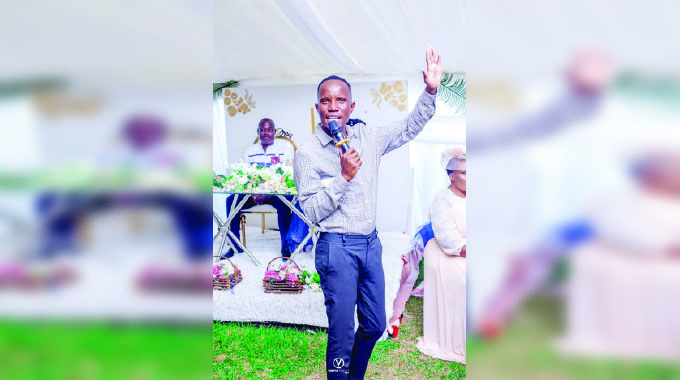Mutamba publishes Tuku Backstage 2nd edition


Journalist and author Shepherd Mutamba holds a copy of the second edition of his book Tuku Backstage
Showbiz Reporter
JOURNALIST and author Shepherd Mutamba who wrote the book Tuku Backstage, Oliver Mtukudzi’s tell-all biography, first published in 2015, has written a second edition to be published next week Monday.
Mutamba said the new book with 255 pages printed on gloss paper, is full colour with 188 pictures, nearly all of them unseen before. A comprehensive discography of Tuku’s music is included in the book with a full list of titles of tracks, on every album, and the years of release from 1978 to 2016.
Boutique Books of South Africa laid out the book that was printed in South Africa by Digital Action.
In the introduction Mutamba writes: “While I recognise the extent of time and hard work that went into the book, what is important is the vision that inspired me to write, in the first place, and present and preserve permanently, for posterity and history, Tuku’s monumental story, as I experienced it, in the form of a book. Significantly, Tuku’s story was being written for the very first time.”
While the first book covered 24 chapters, 11 have now been included in the second edition that also has three pages of references and Tuku’s milestones.
The book, according to Mutamba, details Tuku’s relationship with former President Robert Mugabe and follows up on his alleged son – Selby. The new book also acknowledges recent efforts by Tuku and his daughters Selmor and Sandra, to repair their acrimonious relationship following their fallout in 2012 after Selmor slammed her father as a slipshod dad.
An excerpt from the chapter titled Selby: The Follow-Up reads: Selby said that Tuku is his father and that they related well. “Daddy has never said to me that he isn’t my father. I’ve never heard him say that to me. He pays for my college fees. People, you’re failing to ask the right questions; why is it that I live with Tuku’s sister (in Eastlea) if I’m not Tuku’s son or in Highfield (Tuku’s childhood home)?”
In the first book Tuku vehemently denied Selby’s paternity.
The book contains pictures that illustrate Tuku’s life, work and music.
“The pictures capture some of Tuku’s key points in music but also familiarise the reader, fan and archivist with some of Tuku’s life experiences as a man, family man, husband, father, grandfather, brother, businessperson, and African.
“I photographed the entire book over a period spanning nearly a decade when I worked closely with Tuku as publicist. I interpret his body language to give his fans and readers an understanding of the meaning of some of his gestures, postures and facial expressions when he is communicating non-verbally during a song,” wrote Mutamba in a statement.
A chapter titled Photographing Tuku — The Body Language narrates Mutamba’s first-hand experience and the intricacies of photographing Tuku.
“I reckon that I captured Tuku’s moments of intense emotion more accurately because I gave myself time to understand his musical themes and how certain songs conversed with him and evoked particular reaction and body language.
“I was, thus, able to make out his body language in most of the songs that I was photographing. It was never a matter of pointing my camera and shooting just for the sake of a showbiz picture.”
A passion for music photography and patience, Mutamba said, were also helpful in navigating to the depths of Tuku’s musicianship. An excerpt from the chapter Photographing Tuku — The Body Language reads: “Tuku’s body language is more pronounced in the songs about death, prayer, party music and love; themes that dominate his repertoire. Whenever I captured the special moments of his body language during performances, the pictures conveyed the meaning of a song in a very vivid manner.”
Political issues, in the book, are more elevated in the manner that they speak to Tuku’s political circumstances, as a musician, particularly during the controversial era of former president Robert Mugabe.
“Some of the exclusive pictures in the chapter Politics show Tuku at his premises on different occasions, hosting Mugabe’s special office aides and the top brass from the police, state security and the military; men widely viewed as Mugabe’s accessories to tyranny,” wrote Mutamba.
“Tuku claims so strongly to be apolitical, why then did he surround himself so closely with so many of Mugabe’s feared men, from the police, state security and military sectors, whose offices acted against the will of the people of Zimbabwe? The book expresses the political purpose of artists to keep our leaders in check.”
An excerpt from the chapter titled Tuku Gave Mugabe Thumbs Up reads: “Tuku finally chose 2016 to openly support president Robert Mugabe and the ruling ZANU PF party when the superstar went to entertain him at a campaign rally held at the Robert Mugabe Square in Harare. Tuku’s association with Mugabe and his wife Grace started with small gifts that the musician received from the then First Family.
“The more gifts Tuku received, the closer he became to Zimbabwe’s ruler and the ruling party until such time, in 2016, that he could no longer keep the association with President Mugabe a secret.”
Away from Tuku’s secret life and politics, the second edition interrogates the music even more broadly than previously.
“I added a chapter Collection of Guitars that looks at Tuku’s different types of guitars in his collection. The chapter is complemented by photographs showing some of the guitars in Tuku’s collection.”
On how readers and Tuku’s fans are likely to receive the book, Mutamba said: “The reception will be mixed because, as a writer and human being, I don’t share the same values with everyone and every reader. Some will love the book, others will hate it certainly.
“The first book angered Tuku’s fanatical admirers because of the unflattering comments that I made about his dark past and personality. But fear must not reside in our hearts as writers. If I am not brave I must stop writing because writing is not for cowards.”
If Tuku himself will like the book, Mutamba said: “If Tuku does not live in denial, anymore, he has no reason to dislike the book.”
On why he has taken interest in writing about Tuku, his former publicist responded: “I am publishing because as a writer, I am compelled to tell stories about our lives, circumstances and work and immortalise the narratives and photographs in book form and that to me is a huge and priceless responsibility.”
A foreword to the book was written by David Mungoshi, an academic and author of The Fading Sun and Live Like An Artist. He wrote: “. . . Mutamba is often accused of publishing privileged information in the book. Some readers even argue that, by divulging Oliver Mtukudzi’s closely guarded secrets and moral deficiencies, Mutamba betrayed his close association and the confidence of his one-time employer.
“. . . The truth of the matter, however, is that Oliver Mtukudzi forfeited his privacy when he became an internationally acclaimed musician. His life, music and politics are all fair game now. Despite the feathers that may be ruffled, I commend Mutamba’s book for fact, insight, depth and breadth of research.”








Comments